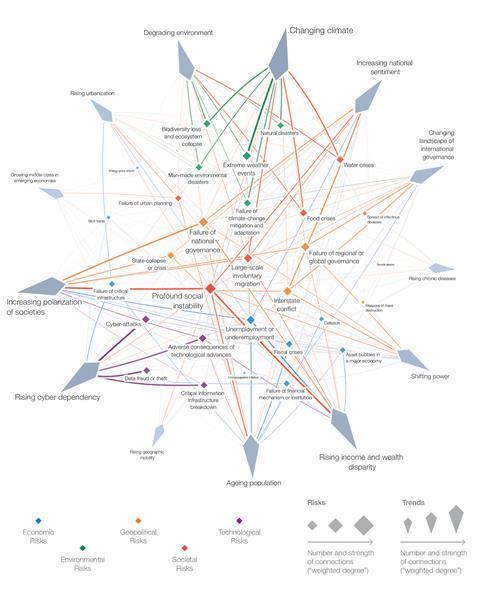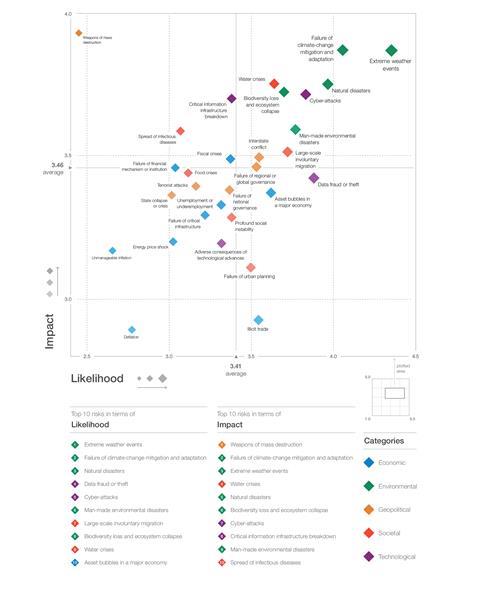Risk managers across Europe react to the findings of this year’s WEF Global Risks report, which warns that “our ability to collaborate on [risks] and then mitigate them is decreasing”
Polarisation of politics and societies, and a weakening of the rules-based international system were headline threats in this year’s Global Risks Report 2019, published by the World Economic Forum (WEF) as policymakers met in Davos.

The report asked whether the world is “sleepwalking into a crisis” as macroeconomic risks appear to have intensified, while the will to tackle them on a global basis has slackened.
Climate, extreme weather and natural disaster risks ranked highly for likelihood but would be tougher to address amid the world’s increasingly messy geopolitics, the WEF emphasised.
“Our ability to collaborate on these risks and then mitigate them is decreasing,” warned Børge Brende, WEF president, speaking to assembled media in London for the report’s release.
When economic growth sooner or later slides back into recession, Børge cautioned that central bankers have limited options to temper the negative effects of a downturn, with interest rates still close to zero.
The contradiction between counter-global protectionism and global issues such as trade, cyber-attacks, and automating technology, makes for bad economics.
“You can’t stop globalisation. The transformation genie is out of the bottle,” Julia Graham, deputy chief executive of UK risk management body Airmic told StrategicRISK.
Taking back control
Protectionist political policies, such as the Donald Trump’s trade war tariffs against China, populist politics such as that of Brexit offering “to take back control”, and popular unrest such as France’s ongoing Gilets jaunes protests, have all worsened the macroeconomic risk landscape within which companies operate.
Conversely, the political risks threading through the 2019 report mean companies sense they have less control or influence against macroeconomic and societal threats at home and abroad.
“There are examples of civil unrest and societal polarisation globally, but the degree of protests recently has been higher in France,” said John Drzik, president of global risk and digital at Marsh.
France has a lively history of public protest influencing political policy more than most European countries, suggested Hans Læssøe, founder of AKTUS consultancy and a former chief risk officer (CRO) at Lego. Social media has only amplified this phenomenon, he added.
“Nothing much changes when you have riots in UK or Germany, but in France the government changes policies. Risks driven by public indignation are particularly relevant to France,” said Læssøe.
Proactive planning

Strong scenario planning is increasingly important for resilience, Drzik emphasised, as threats – such as civil unrest, changes to immigration policy concerning company employees, or critical infrastructure failures – could all cause disruption.
“Be proactive in your planning,” said Drzik. “We advise more energetic scenario planning and planning for response to events. Cyber risk is a good example, as a risk that companies now regard as inevitable.”
Table-top exercises can reveal risks, but real-life exercises can be better at determining resilience for business continuity planning (BCP), noted Karla Gahan, deputy global head of risk and advisory at consultancy VinciWorks.
“Run it as a live exercise, because testing is the key,” said Gahan. “If you’re denied access to a building, what are you going to do? Can you shift services from Paris to another location, or from an office in one country to another?
“If you plan for employees to log in remotely, perhaps you’ll find you lack bandwidth. In France, because labour laws are restrictive you might find support staff cannot work remotely,” Gahan continued.
Scenario analysis by a team with diverse opinions can identify risks earlier, said Eugenie Molyneux, CRO for Zurich’s commercial insurance arm. Although interconnected risks can create unintended consequences.
“Even if you mitigate a risk completely, you’re probably introducing a new risk,” Molyneux said. “It’s rare that mitigating actions are fool proof, but what you don’t want is an echo chamber.”
Climate change, risen in the 2019 risk ranks, should be another focus of scenario analysis. Otherwise there is a danger of companies focusing on short-term risks and sleepwalking into climate risk seen as dangerous but long-term in impact.
“Organisations are focused on political and trade risks. They don’t prioritise climate as a risk for next year. Bridging that is a challenge for society,” said Alison Martin, group CRO for Zurich Insurance Group.




















1 Readers' comment